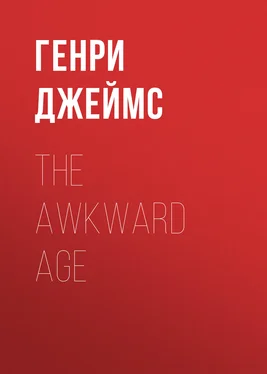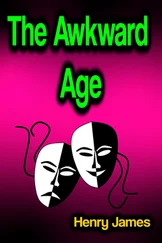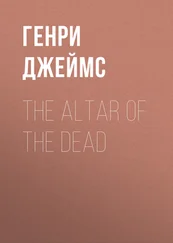Генри Джеймс - The Awkward Age
Здесь есть возможность читать онлайн «Генри Джеймс - The Awkward Age» — ознакомительный отрывок электронной книги совершенно бесплатно, а после прочтения отрывка купить полную версию. В некоторых случаях можно слушать аудио, скачать через торрент в формате fb2 и присутствует краткое содержание. Жанр: foreign_prose, foreign_antique, на английском языке. Описание произведения, (предисловие) а так же отзывы посетителей доступны на портале библиотеки ЛибКат.
- Название:The Awkward Age
- Автор:
- Жанр:
- Год:неизвестен
- ISBN:нет данных
- Рейтинг книги:5 / 5. Голосов: 1
-
Избранное:Добавить в избранное
- Отзывы:
-
Ваша оценка:
- 100
- 1
- 2
- 3
- 4
- 5
The Awkward Age: краткое содержание, описание и аннотация
Предлагаем к чтению аннотацию, описание, краткое содержание или предисловие (зависит от того, что написал сам автор книги «The Awkward Age»). Если вы не нашли необходимую информацию о книге — напишите в комментариях, мы постараемся отыскать её.
The Awkward Age — читать онлайн ознакомительный отрывок
Ниже представлен текст книги, разбитый по страницам. Система сохранения места последней прочитанной страницы, позволяет с удобством читать онлайн бесплатно книгу «The Awkward Age», без необходимости каждый раз заново искать на чём Вы остановились. Поставьте закладку, и сможете в любой момент перейти на страницу, на которой закончили чтение.
Интервал:
Закладка:
Mr. Longdon’s assent was mute. “Ah she was not the worst! I mean that what made it so bad,” he continued, “was that they all really liked me. Your mother, I think—as to THAT, the dreadful consolatory ‘liking’—even more than the others.”
“My mother?”—Vanderbank was surprised. “You mean there was a question—?”
“Oh for but half a minute! It didn’t take her long. It was five years after your father’s death.”
This explanation was very delicately made. “She COULD marry again.”
“And I suppose you know she did,” Vanderbank returned.
“I knew it soon enough!” With this, abruptly, Mr. Longdon pulled himself forward. “Good-night, good-night.”
“Good-night,” said Vanderbank. “But wasn’t that AFTER Lady Julia?”
On the edge of the sofa, his hands supporting him, Mr. Longdon looked straight. “There was nothing after Lady Julia.”
“I see.” His companion smiled. “My mother was earlier.”
“She was extremely good to me. I’m not speaking of that time at Malvern—that came later.”
“Precisely—I understand. You’re speaking of the first years of her widowhood.”
Mr. Longdon just faltered. “I should call them rather the last. Six months later came her second marriage.”
Vanderbank’s interest visibly improved. “Ah it was THEN? That was about my seventh year.” He called things back and pieced them together. “But she must have been older than you.”
“Yes—a little. She was kindness itself to me at all events, then and afterwards. That was the charm of the weeks at Malvern.”
“I see,” the young man laughed. “The charm was that you had recovered.”
“Oh dear, no!” Mr. Longdon, rather to his mystification, exclaimed. “I’m afraid I hadn’t recovered at all—hadn’t, if that’s what you mean, got over my misery and my melancholy. She knew I hadn’t—and that was what was nice of her. She was a person with whom I could talk about her.”
Vanderbank took a moment to clear up the ambiguity. “Oh you mean you could talk about the OTHER. You hadn’t got over Lady Julia.”
Mr. Longdon sadly smiled at him. “I haven’t got over her yet!” Then, however, as if not to look morbid, he took pains to be clear. “The first wound was bad—but from that one always comes round. Your mother, dear woman, had known how to help me. Lady Julia was at that time her intimate friend—it was she who introduced me there. She couldn’t help what happened—she did her best. What I meant just now was that in the aftertime, when opportunity occurred, she was the one person with whom I could always talk and who always understood.” He lost himself an instant in the deep memories to attest which he had survived alone; then he sighed out as if the taste of it all came back to him with a faint sweetness: “I think they must both have been good to me. At the Malvern time, the particular time I just mentioned to you, Lady Julia was already married, and during those first years she had been whirled out of my ken. Then her own life took a quieter turn; we met again; I went for a good while often to her house. I think she rather liked the state to which she had reduced me, though she didn’t, you know, in the least presume on it. The better a woman is—it has often struck me—the more she enjoys in a quiet way some fellow’s having been rather bad, rather dark and desperate, about her—for her. I dare say, I mean, that though Lady Julia insisted I ought to marry she wouldn’t really have liked it much if I had. At any rate it was in those years I saw her daughter just cease to be a child—the little girl who was to be transformed by time into the so different person with whom we dined to-night. That comes back to me when I hear you speak of the growing up, in turn, of that person’s own daughter.”
“I follow you with a sympathy—!” Vanderbank replied. “The situation’s reproduced.”
“Ah partly—not altogether. The things that are unlike—well, are so VERY unlike.” Mr. Longdon for a moment, on this, fixed his companion with eyes that betrayed one of the restless little jumps of his mind. “I told you just now that there’s something I seem to make out in you.”
“Yes, that was meant for better things?”—Vanderbank frankly took him up. “There IS something, I really believe—meant for ever so much better ones. Those are just the sort I like to be supposed to have a real affinity with. Help me to them, Mr. Longdon; help me to them, and I don’t know what I won’t do for you!”
“Then after all”—and his friend made the point with innocent sharpness—“you’re NOT past saving!”
“Well, I individually—how shall I put it to you? If I tell you,” Vanderbank went on, “that I’ve that sort of fulcrum for salvation which consists at least in a deep consciousness and the absence of a rag of illusion, I shall appear to say I’m wholly different from the world I live in and to that extent present myself as superior and fatuous. Try me at any rate. Let me try myself. Don’t abandon me. See what can be done with me. Perhaps I’m after all a case. I shall certainly cling to you.”
“You’re too clever—you’re too clever: that’s what’s the matter with you all!” Mr. Longdon sighed.
“With us ALL?” Vanderbank echoed. “Dear Mr. Longdon, it’s the first time I’ve heard it. If you should say the matter with ME in particular, why there might be something in it. What you mean at any rate—I see where you come out—is that we’re cold and sarcastic and cynical, without the soft human spot. I think you flatter us even while you attempt to warn; but what’s extremely interesting at all events is that, as I gather, we made on you this evening, in a particular way, a collective impression—something in which our trifling varieties are merged.” His visitor’s face, at this, appeared to acknowledge his putting the case in perfection, so that he was encouraged to go on. “There was something particular with which you weren’t altogether pleasantly struck.”
Mr. Longdon, who decidedly changed colour easily, showed in his clear cheek the effect at once of feeling a finger on his fault and of admiring his companion’s insight. But he accepted the situation. “I couldn’t help noticing your tone.”
“Do you mean its being so low?”
He had smiled at first but looked grave now. “Do you really want to know?”
“Just how you were affected? I assure you there’s at this moment nothing I desire nearly so much.”
“I’m no judge then,” Mr. Longdon began; “I’m no critic; I’m no talker myself. I’m old-fashioned and narrow and ignorant. I’ve lived for years in a hole. I’m not a man of the world.”
Vanderbank considered him with a benevolence, a geniality of approval, that he literally had to hold in check for fear of seeming to patronise. “There’s not one of us who can touch you. You’re delightful, you’re wonderful, and I’m intensely curious to hear you,” the young man pursued. “Were we absolutely odious?” Before his guest’s puzzled, finally almost pained face, such an air of appreciating so much candour, yet of looking askance at so much freedom, he could only try to smooth the way and light the subject. “You see we don’t in the least know where we are. We’re lost—and you find us.” Mr. Longdon, as he spoke, had prepared at last really to go, reaching the door with a manner that denoted, however, by no means so much satiety as an attention that felt itself positively too agitated. Vanderbank had helped him on with the Inverness cape and for an instant detained him by it. “Just tell me as a kindness. DO we talk—”
“Too freely?” Mr. Longdon, with his clear eyes so untouched by time, speculatively murmured.
Читать дальшеИнтервал:
Закладка:
Похожие книги на «The Awkward Age»
Представляем Вашему вниманию похожие книги на «The Awkward Age» списком для выбора. Мы отобрали схожую по названию и смыслу литературу в надежде предоставить читателям больше вариантов отыскать новые, интересные, ещё непрочитанные произведения.
Обсуждение, отзывы о книге «The Awkward Age» и просто собственные мнения читателей. Оставьте ваши комментарии, напишите, что Вы думаете о произведении, его смысле или главных героях. Укажите что конкретно понравилось, а что нет, и почему Вы так считаете.












